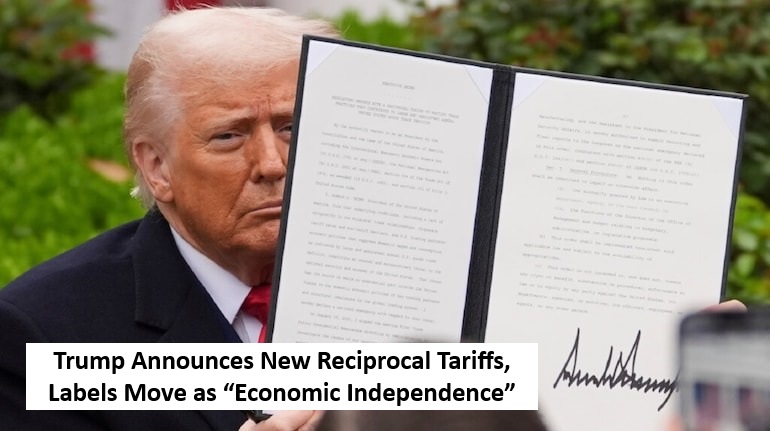
On Wednesday, US President Donald Trump unveiled a comprehensive tariff plan, calling it a “declaration of economic independence.” These import duties, which he termed "reciprocal tariffs," are designed to mirror the treatment he claims the US has received from trading partners over decades. The new rates range from 10% to 49%.
Trump stated that American taxpayers have been overcharged for more than 50 years. He positioned the new tariffs as a tool to bring back jobs and manufacturing to the United States, calling the economic shift a matter of national security and essential to preserving the country’s way of life.
Key Highlights of the Reciprocal Tariff Rollout
1. Implementation Timeline
A 10% base tariff begins April 5 at 12:01 AM (0401 GMT).
Higher duties for top offending countries start April 9.
Country-specific rates include:
China: 34% (plus existing 20% fentanyl tariff = 54%)
India: 26%
South Korea: 25%
Japan: 24%
European Union: 20%
2. Tariff Exemptions
Exempted goods: copper, pharmaceuticals, semiconductors, lumber, gold, and energy.
Canada and Mexico are excluded but still face duties under the USMCA agreement.
Nations already under US sanctions (Cuba, Belarus, North Korea, Russia) are unaffected.
Major Impact on Automotive and Industrial Goods
A 25% tariff on imported automobiles takes effect on April 5, along with duties on auto parts by May 3. The pre-existing 25% tariffs on steel and aluminum will now apply to products like canned beer and aluminum cans starting April 6.
Trump also indicated that future tariffs may target high-tech sectors such as semiconductors, pharmaceuticals, and essential minerals.
Oil Trade and Secondary Tariffs
From April 2, the US will impose a 25% duty on oil imports from countries purchasing Venezuelan crude. The administration is also reviewing secondary sanctions on Russian oil.
Crackdown on Chinese E-Commerce Imports
In a move aimed at companies like Shein and Temu, the US is ending the duty-free allowance for small packages from China. Starting May 2, a 30% tariff or a $25 minimum per item will apply, increasing to $50 per item after June 1.
Global Reactions and Market Response
China criticized the new measures, warning that they may harm global economic stability. The announcement caused sharp drops in stock markets, with Japan’s Nikkei index falling over 4% and Vietnam’s market declining more than 5% after being hit with a 46% tariff rate.
Read More: Aramco Under Fire: Second Drone Attack in 48 Hours Rattles Global Oil Markets

 Share
Share_722031383_100x75.jpg)



